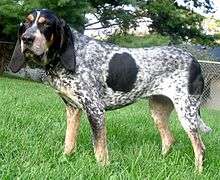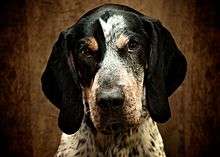Bluetick Coonhound
 Bluetick Coonhound | |||||||||||||||||||||||||||||
| Origin | United States | ||||||||||||||||||||||||||||
|---|---|---|---|---|---|---|---|---|---|---|---|---|---|---|---|---|---|---|---|---|---|---|---|---|---|---|---|---|---|
| |||||||||||||||||||||||||||||
| |||||||||||||||||||||||||||||
| Domestic dog (Canis lupus familiaris) | |||||||||||||||||||||||||||||
The Bluetick Coonhound is a breed of Coonhound originating in the United States. The Bluetick Coonhound is known for its friendly persona, cold nose and deep bawl mouth.[1] It is most commonly used as a raccoon hunting dog, but may also be kept as a pet.
Description
Appearance

The overall build of the Bluetick Coonhound is muscular and speedy. The head is carried up and the tail carried over the back, without signs of fear or nervousness. The Bluetick coat should be moderately coarse and glossy. The Bluetick Coonhound gets its "blue" coloring from black ticking on a white background, which gives the impression of a navy blue color. This ticking covers the body and can be interspersed with variously-shaped black spots on the back, ears and sides. Preference runs to more blue than black on the body. Black should predominate on the head and ears. Bluetick Coonhounds should have tan dots over the eyes and the sides of the muzzle will be tan. There is generally a ticked blaze running up the face. Bluetick Coonhounds should be 21 inches -27 inches tall at the shoulder and weigh approximately 55 to 80 pounds (25 to 36 kg). Females are considerably smaller. Feet should be cat-like, rounded with well-arched toes. Their paws are larger than nearly all other breeds of dogs. Rear legs should have a moderate bend at the hocks. All legs should be straight from the dog's body to the ground when viewed from the front or rear.
Gascon blues are larger than standard Blueticks, with males a minimum of 27 inches and a maximum of 30 inches, per the American Blue Gascon Hound Association's breed standard.[2]
Temperament
Bluetick Coonhounds are bred to be hunting dogs. They are athletic, hardy, and need a full-time job or activity such as hunting, obedience, or agility to stay happy. They can be challenging to train and they should be monitored around cats or other small animals. They are, like their hound counterparts, very intelligent breeds, with an uncanny knack for problem-solving.
Once trained, the members of the breed are very mindful of their owner. Something first time owners should be aware of is the daunting task of "voice-training" these dogs. They tend to be relentlessly loud barkers and/or howlers. If properly socialized from a young age, they can make a great family pet. These dogs were bred to be working/hunting dogs.
In normal conditions, this dog is excellent around children. They are mindful and friendly dogs. However their noses will keep them in trouble, so food and garbage should never be left out unattended. The breed is often mistaken for being aggressive as the breed will "greet" strangers with its signature howl and will sniff the subject until satisfied. Usually, this is just the way the breed gets to know its subjects. Since Blueticks are driven by their strong sense of smell, they make excellent hunting/tracking dogs. If allowed, they will tree almost any animal smaller than them. Blueticks are generally easier to handle in the field than some other coon hounds.
History
The Bluetick Coonhound, which originated in Louisiana, was developed from the Bleu de Gascogne hound of southwest France, as well as the English Foxhound, the cur dog, the American Foxhound, and the Black And Tan Virginia Foxhound. Originally, Bluetick Coonhounds were registered in the United Kennel Club under the English Foxhound and Coonhound, but were recognized by the club as a separate breed in 1946. Bluetick Coonhounds are also recognized by the Australian National Kennel Council and the New Zealand Kennel Club. In April 2009 the breed was accepted by the American Kennel Club and in December 2009 they became eligible to compete in AKC coonhound events.[3][4] The American Blue Gascon is a subgroup of Bluetick Coonhounds that is larger, heavier, and more "houndy" looking than the standard Bluetick. American Blue Gascons are often referred to as "old-fashioned" Blueticks. This is due to their appearance and "colder" nose, or slower style of tracking, compared to other modern coonhound breeds.
Famous Bluetick Coonhounds
- Smokey, the mascot of the University of Tennessee, is a Bluetick.
- A Bluetick Coonhound named Tet was the companion of Stringfellow Hawke, the main character of the popular 1980s television show Airwolf.
- Old Blue, a Bluetick Coonhound, was in the 1960 Elia Kazan film, Wild River.
- Old Blue was a Bluetick Coonhound belonging to the Pritchard boys in the novel Where the Red Fern Grows by Wilson Rawls.
- A female Bluetick Coonhound is mentioned in the George Jones song "Ol' Red" which was later covered by Blake Shelton.
- Huckleberry Hound is a Bluetick.
- Savage Sam, the sequel to Old Yeller, is about a Bluetick Coonhound.
- Lillian's dog, Gideon, is a Bluetick Coonhound in the song "Red Dirt Girl" written by Emmylou Harris.
- A Bluetick Coonhound is referenced in the song "Long Haired Country Boy" written by Charlie Daniels.
- A Bluetick hound is referred to in the 2016 song "Church Bells," written by Zach Crowell, Brett James and Hillary Lindsey, and sung by Carrie Underwood.
References
- ↑ http://www.coondawgs.com/bluetickcoonhound[]
- ↑ http://www.abgha.org/standard.htm
- ↑ http://www.akccoonhounds.org/registration.asp
- ↑ American Kennel Club (2009), AKC Gazette, 126, American Kennel Club, Inc.